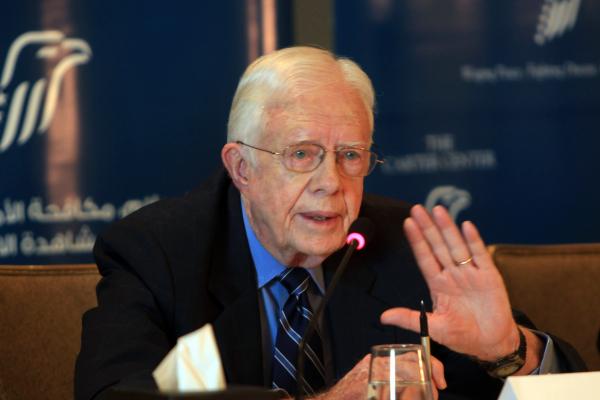Earlier this week, former President Jimmy Carter critiqued the United States for its (read: our) deteriorating record on human rights and rule of law in the last decade.
But those responding to Carter's New York Times Op-Ed (“A Cruel and Unusual Record”) have largely missed his main point. In the spirit of the Sermon on the Mount, Carter wants to lead America in removing the log from our own eye in hopes of honoring God and regaining our position as champions of human rights and rule of law.
During his visit to Cairo for the Egyptian elections, Carter met with the Grand Imam of Al Azhar — the most authoritative voice in Sunni Islam. Discussing human rights, religion, and the historic election that was taking place outside, Carter exhibited a rare humility in articulating his convictions. I feel that a whole range of human interactions might be improved if we would each remove the log from our own eye before trying to remove the speck from our neighbor’s.
Sitting with women’s rights activists and top Christian leadership; in private briefings and press conferences, this self-critique proved central to Carter’s efforts to build trust and advance human rights in Egypt and around the world.
After decades of lectures from the White House and U.S. State Department, much of the world has grown tired of the West’s wagging finger and “holier than thou” attitude. There may have been an era when this posture had a greater effect, but the U.S. has lost too much of its moral credibility in the wake of Abu Ghraib, Guantanamo, and drone strikes carried out against the President Obama's “Hit List”.
Critics have portrayed Carter’s piece as a scathing critique of President Obama. But it is much more than that. And that is precisely why his approach is so refreshing and instructive.
It was not until I moved to Iraq that I saw the logs in my eyes. I decried the evils of Saddam Hussein while ignoring the way we propped him up against more urgent enemies. I cried in the homes of Saddam’s torture victims while endorsing America’s right to torture. I railed against the rise in birth defects from Saddam’s chemical attacks while the US government unleashed depleted uranium in spite of serious claims of heightened cancers and birth defects.
One day, after hundreds of Iraqi families had asked me to save the lives of their children with birth defects, I stood inside the operating room as my colleague performed heart surgery on a little girl. Before entering the O.R. he scrubbed his hands and cleaned his surgical lenses. He took care of himself first to save her life. But here I was with dirty hands and a log in my eye trying to fix every one else.
Carter’s confessions to foreign leaders are not merely symbolic — as though he must search for a token American violation in order to get a foot in the door with those who perpetrate the really bad things. Despite all the truly great things we have done as a nation when we have lived from postures of grace, it seems we have again thrown up our collective hands in fear and allowed our government to erode the fabric of our humanity. And now that it is officially inexpedient to be humane, we are less human than we once were.
To reclaim our humanity we must claw our way out of the Land of Fear — a dark forest where we are told that the only thing that matters is being safe. In the Land of Fear we obsess over another’s speck while denying our personal log. In the Land of Grace we care deeply about the speck because it besets those God loves, but we acknowledge that we are unfit to help unless we clean our hands and our eyes of the logs that impair us.
Jeremy Courtney lives in Iraq, pursuing peace and providing lifesaving heart surgeries to Iraqi children as founder of the Preemptive Love Coalition. All views are his own. Join the dialogue on Twitter @JCourt.
Got something to say about what you're reading? We value your feedback!
